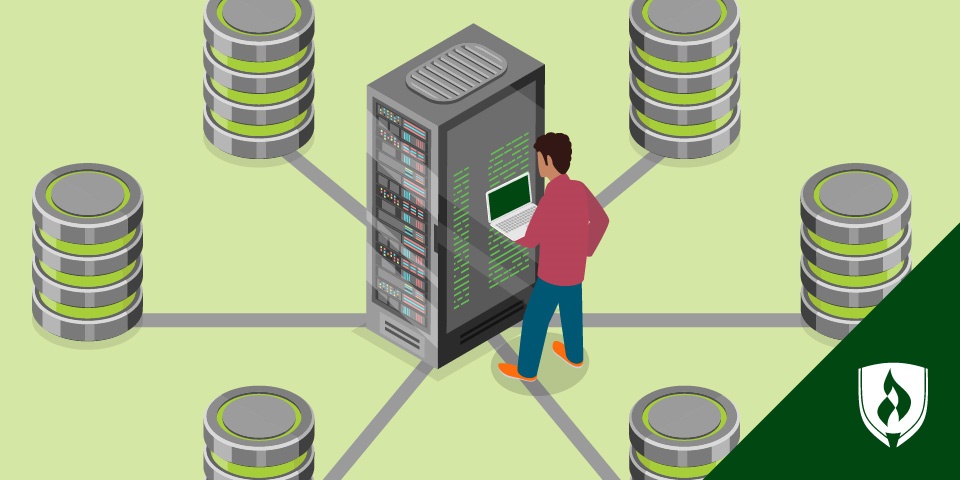
The technology field intrigues you, and with good reason. The computer and information technology field is projected to grow at a faster than average rate in the coming years. With this exciting amount of growth, over a half million new jobs will be added through 2026, according to the Bureau of Labor Statistics (BLS).* One of those jobs could belong to you!
With technology’s sunny outlook, it’s no wonder why you’re intrigued. But first you have a few questions you need answered. Mainly, how hard is computer science to learn? Is this something you could feasibly pick up and make a career out of? Why study Computer Science? Would it be right for you?
Let us put your worries to rest. We spoke with a handful of tech experts and people who have been in your shoes to find the answers. Keep reading to see what they reveal about your most pressing computer science FAQs.
Your most common Computer Science FAQs answered
1. How hard is computer science?
It’s the question you need answered: How hard is computer science? Is it something that anyone could learn? The short answer is that computer science is not necessarily difficult if you have patience and determination.
“After having successfully completed university as a Computer Science major, I can assure you that it is not ‘too difficult,’” says Cristian Rennella, CEO and cofounder of elMejorTrato. “If you want to start from scratch, I recommend you take the time that is necessary to understand the foundations. Take your time, because being disciplined, methodical and patient become the most important skills in computer science.”
Like any area of study, Computer Science is what you make of it. It takes time and dedication to master the concepts, theories and application of what you’ve learned. With that comes a lot of trial and error. Creativity and analytical thinking skills are important here in order for students to find a resolution.
“Computer science is not hard at all, but you need to be scientifically inclined to major in it,” says Gene Mal, CTO of Static Jobs.
Above all else, a “scientifically inclined” individual must be curious. They should wonder how things work, make speculations and be comfortable testing those speculations to find conclusions. They must be inquisitive and want to seek answers—and when answers don’t present themselves quickly, students must be resilient. That resolve goes a long way in determining whether or not you’ll be successful studying Computer Science.
2. How much math is in computer science?
It’s no secret math is a sore subject for some, so it’s no surprise that you may be wondering how mathematics factors into a Computer Science degree program.
The answer to your question depends on the type of school and program you choose. For example, a career-focused Computer Science program may include math courses such as statistics and analysis, but the main emphasis of your coursework is to master the technological concepts and hands-on skills that you’ll use in the field. That being said, you can still expect a fair amount of mathematics in any school offering a Computer Science degree—computing and programming concepts are built on a foundation of math.
Fortunately, much of the math that comes into play with computer science is relatively easy to put into context and conceptualize—concepts like probabilities and statistical modeling deal with fairly concrete ideas that aren’t too hard to put into real-world terms. Additionally, if you don’t find that math is your biggest strength, know that it’s not necessarily common in the day-to-day duties of many positions once you enter the field.
“Once you graduate, many computer programmers need to know only four basic arithmetic operations: addition, subtraction, multiplication and division,” Mal says.
Even if you’re not the world’s biggest math whiz, don’t let one factor hold you back. Math is a tricky subject for a lot of people—ask your instructors for help, seek tutoring and know that there’s a ton of free remedial online math resources out there to help you get up to speed.
3. Why study Computer Science?
If you’re still on the fence, you probably need this lingering question to be answered: Why study Computer Science? One compelling reason is that it opens many doors within technology—a field growing faster than the average rate. , according to the BLS.*
Careers in the technology field could allow you to earn a healthy salary. But also know that your options won’t be limited. A Computer Science degree doesn’t lead into a single track—it opens many professional possibilities. To give you a sense of the breadth of career paths available to Computer Science degree holders, we scoured thousands of real job postings from the past year.** Take a look at some of the titles below seeking candidates with Computer Science degrees.
- Software development engineer
- Java software developer
- Systems engineer
- Software developer
- Network engineer
- Business analyst
- Systems administrator
- Solutions architect
- Applications developer
- .Net developer
As you can see, a Computer Science degree can lead into a spectrum of careers within the technology field. You can rest easy knowing your options won’t be limited upon graduation.
Is Computer Science right for you?
Now that you know more about the difficulty of Computer Science, you should feel more confident in your ability to pursue this exciting area of study. Even if you don’t consider yourself a “techie” or a computer whiz, don’t write a Computer Science degree off just yet. With the right approach of patience, curiosity, creativity and resilience, students from all backgrounds and interests can succeed—and that’s important! As the world around us becomes increasingly technical, professionals with an understanding of computer science concepts and principles will be needed to serve the digital economy’s demand.
But before you can head out and take on the technology changing the world, you’ll need an education under your belt—one that teaches you exactly what you need to know. Learn more about taking the next step by checking out our article, “10 Things You Didn't Know About the Rasmussen College Computer Science Program.”
Related Articles:
- Big Data Can Do What? 9 Capabilities that Might Surprise You
- Computer Science vs. Data Science: Decoding Your Ideal Career Path
- Programmer vs. Developer: Cracking the Code Behind Commonly Confused Career Paths
- Women in Tech Share 5 Tips for Succeeding in a Male-Dominated Field
- What Is a Webmaster and Do They Still Exist?
- Working From Home and Information Technology: How Remote Work Is Changing IT
- 11 Technology Documentaries on Netflix to Stream in 2019
*Bureau of Labor Statistics, U.S. Department of Labor, Occupational Outlook Handbook, [career information accessed April 23, 2018] www.bls.gov/ooh/.
** Burning-Glass.com (Analysis of 731,548 jobs seeking Computer Science degree holders from April 1, 2017 – March 31, 2018.)




